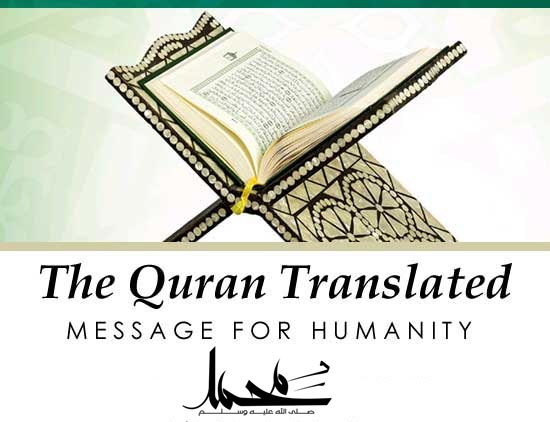The book you are about to read is an English translation of the Scripture that Prophet Muhammad said was revealed to him by God, word for word, in the Arabic language. This Scripture is still in existence and hundreds of thousands of Muslims the world over, including non-Arabic speakers, have it preserved in their memories, just as they have been preserving it for the past fourteen centuries. This book is the Quran.
This book is not only still with us in its original form, but the life of the man to whom it was revealed is also recorded in authentic historical records so meticulously that some of the Westerners who studied his life have described him as being “the only historical figure among founders of religions”.
Muhammad was a Prophet chosen by God to be the recipient of a divine message. He was entrusted with the task of conveying this message to the people around him, and through them, to all people throughout the world. As a Prophet and Messenger of God to His servants, Muhammad was not something new; he was merely the last in a long chain of Prophets and Messengers. Many were those upon whom God bestowed the honor of being the recipients of His message, who He appointed to be examples of righteousness for the rest of humanity. The Quran mentions a number of these Prophets, including Adam, Noah, Abraham, Moses and Jesus.
The core message they all brought was the same: Islam, submission to God by worshipping none but Him. Every one of them was charged with conveying this message as well with showing the people of their time how to live by it. Being the last of these Prophets, Muhammad was to be God’s final and therefore universal Messenger.
How do we know whether someone is an imposter or a true Prophet? This is indeed a very vital question requiring serious thought. It is clear that there is no way for us to decide this issue except by examining the character as well as the message of the person who makes such a claim. We naturally start by ascertaining the historical authenticity of the records that describe the life and teachings of the claimant. Next we must examine the character of the person who made the claim especially regarding his truthfulness. Finally we need to look carefully into the message which he claimed to have received from God:
- Does it contain any factual falsehoods or contradictions?
- How far is it comprehensive?
- To what extent is it consistent with the attributes which we know God must have?
And so forth.
One might ask: “why we should take the trouble?”
The answer is clear. If we are believers in God, we will know that He is a Merciful and Wise Lord, because it is He Who has given us our lives and is providing for all of our needs. Being our Creator, He knows that we have spiritual needs as well. As believers in Him, we need to know how to lead a life that is in agreement with that belief and pleasing to Him. We need to know how to worship Him, and on what principles to establish our relationships with one another: whether political, social, economic, or otherwise.
This leads us to the conclusion that the Merciful and Wise God who provided us with all of our material needs will not neglect to provide us with our spiritual needs as well. We must also conclude that such guidance from Him can only come as a message from Him and that there must be such a message somewhere in the world, a message that must be available to all who seek it.
Here is the book that Muslims claim contains that message, and the following is a sketch of the life of the Messenger who brought it.
To read the Quran, Download Free Copy in PDF format here.
To read a biography of Prophet Muhammad (pbuh), Download a free copy here.
Extracted from : Quran Translated
 navedz.com a muslim's Quest for the truth
navedz.com a muslim's Quest for the truth









